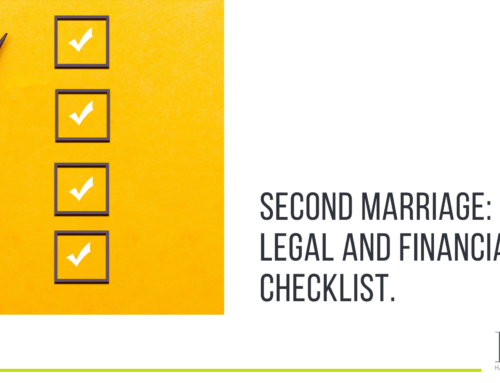Prenups. They get a lot of attention in the media, especially when it comes to celebrity relationships. You may have seen headlines about Justin Timberlake and Jessica Biel’s prenup, with its alleged $500,000 cheating clause. Last year, Britney Spears and Sam Asghari’s prenup was in the spotlight as Asghari reportedly challenged the agreement in the midst of their divorce.
But prenups are more than just fodder for celebrity gossip columnists. Even for those of us who aren’t multi-millionaires, prenups are a sensible option, and they’re becoming increasingly common here in the UK. But how binding is a prenup, and is it possible to renegotiate one down the line?
What is a prenup?
A prenup (or prenuptial agreement) sets out each person’s assets before they tie the knot and how they will be divided in the event the marriage breaks down. Once seen as something reserved for the super wealthy, 1 in 5 weddings now start with a prenup.
The more cynical among us might think that signing a prenup is just preparing for divorce before you even get married, like a self-fulfilling prophecy. But there are actually a lot of reasons you should consider a prenuptial agreement, like encouraging honesty and openness from the start. (If you’re living with your partner and don’t plan on getting married, you might want to consider a cohabitation agreement).
Approaching the topic of a prenup with your partner can be tricky, especially if they’re strongly opposed to the idea. But it’s really important to have these conversations as early as possible to help safeguard both of your futures. If you never have to think about your prenup again after signing it – great. If the relationship does sadly break down, you’ll be grateful for your foresight.
When can you renegotiate your prenup?
You might want to renegotiate your prenup during your marriage if your circumstances change significantly. For example, if either you or your partner need to give up your career due to caring responsibilities or illness, or if either of you starts a new business. This can help both of you to feel happier and more secure moving forward. If you both agree to renegotiate your prenup agreement, you should each have legal representation to make sure the new agreement is fair for everyone involved.
Renegotiating a prenuptial agreement after the marriage has broken down is a far trickier matter. Your ability to negotiate would depend on how long ago the prenup was signed and whether your circumstances have changed during the course of your marriage. That’s why it’s far better to alter your prenup when necessary while you’re still together.
Is a prenup legally binding?
Prenuptial agreements are not legally binding in England and Wales. That being said, prenups are given weight in court when splitting financial assets during a divorce as long as:
- The agreement was created at least three weeks before the marriage.
- Both parties entered into the agreement voluntarily.
- Both parties received independent legal advice before signing.
- Both parties fully disclosed all assets when the agreement was created.
Reviewing your prenup
Even though a prenup isn’t legally binding, it can still influence how assets are split in the event of a divorce. Prenups carry most weight when they are up to date and reflect a couple’s current financial situation. If one or both or your circumstances have changed significantly, the court may be less inclined to take the original agreement into account.
That’s why it’s so important to review your prenup regularly – ideally every five years. This will give you and your partner a chance to reflect on any changes that should be accounted for in your prenuptial agreement and renegotiate if necessary. Though it can feel uncomfortable, having these conversations during the relationship is much easier than hashing it out during a divorce.
Need advice on your prenup?
If you and your partner are considering a prenup, or want to know more about reviewing or renegotiating your agreement, we’d be happy to help. Contact Harrogate Family Law for our friendly and impartial expert advice.






